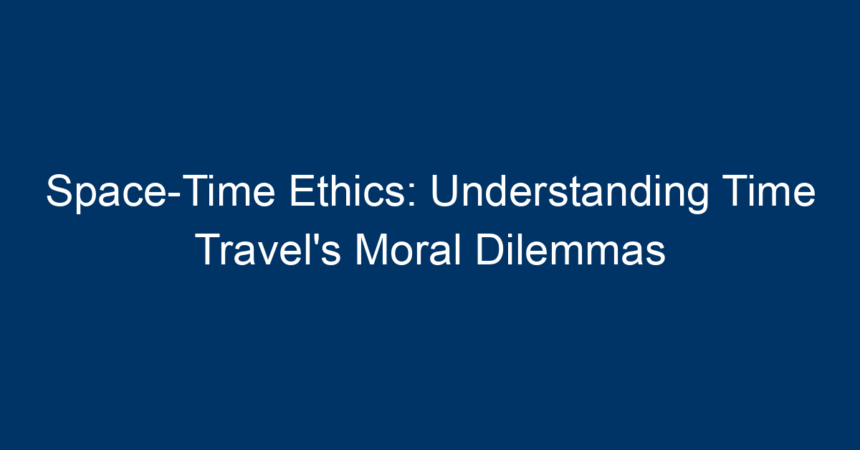The concept of time travel has long captivated our imaginations, igniting curiosity in books, movies, and philosophical discussions. As we delve deeper into the realm of possibilities through advancements in science, the intriguing question arises: what are the ethical implications intertwined with the very fabric of space-time? Space-time ethics encompasses a host of moral dilemmas that challenge our understanding of right and wrong in scenarios where the past, present, and future can be navigated. This article explores these complex moral landscapes, encouraging thoughtful reflection on the responsibilities tied to such profound capabilities.
The Basics of Space-Time Ethics
Defining Space-Time Ethics
Space-time ethics is a philosophical framework that examines the moral considerations and implications of actions within the space-time continuum. It delves into questions about free will, responsibility, and the ethical consequences of altering events that have already occurred or might occur in the future. As technology advances and brings us closer to theories surrounding time travel, understanding these nuances becomes increasingly important.
The Theoretical Foundations of Time Travel
Time travel, while still theoretical, is often discussed in relation to Einstein’s theory of relativity. This theory suggests that time is not absolute, but rather relative, shaped by variables such as gravity and speed. Concepts like wormholes and closed time-like curves spark debate about the feasibility of traveling through time—and consequently, the ethical repercussions of such journeys. What happens if we could genuinely manipulate time? Could we rewrite history or shape the future, and at what cost?
The Moral Dilemmas of Time Travel
Altering Historical Events
One of the most significant dilemmas in space-time ethics arises from the idea of changing historical events. Imagine if a time traveler ventured back to prevent a catastrophic event, such as a war or a natural disaster. While the intention is noble, this action raises crucial ethical questions:
-
The Butterfly Effect: Every small change in the past could create monumental, unintended consequences in the future. A single intervention might prevent one tragedy but could spawn a series of new and possibly worse events.
- Moral Responsibility: If a time traveler alters an event, who bears the responsibility for the outcome? The time traveler, or those who benefit from or are harmed by the change?
The Consequences of Foreknowledge
What if time travelers could access future knowledge? This foresight presents its own ethical challenges. For instance:
-
Exploitation and Greed: Imagine having knowledge of future stock market trends. Individuals with this information might exploit their advantage for personal gain, leading to inequality and moral decay within society.
- Preventing Future Events: Should one intervene to prevent future tragedies based on foreknowledge? Do we have a moral obligation to act, even if the ramifications remain uncertain?
The Ethics of Personal Time Travel
Personal time travel presents unique moral dilemmas. Consider a scenario where one travels back to relive cherished moments or avert personal mistakes. Here are key concerns:
-
Avoiding Regret: While it is tempting to erase regrets, could this diminish personal growth? Each experience, however painful, contributes to our character and moral framework.
- Impact on Relationships: Changing one’s past could have profound effects on relationships with others. What rights do we hold over the memories and experiences of those around us?
Philosophical Perspectives on Space-Time Ethics
Utilitarianism vs. Deontology
Two significant ethical frameworks—utilitarianism and deontology—offer contrasting lenses through which to examine space-time ethics.
Utilitarianism
Utilitarianism emphasizes actions that maximize overall happiness. In the context of space-time ethics, this approach would advocate for time travel if it leads to the greatest benefit for the most people. However, utilitarian reasoning may justify harmful actions against a few individuals if the outcome favors the majority—a reproductive ethical dilemma when weighing the morality of altering historical events.
Deontology
In contrast, deontological ethics stresses the importance of duty and rules. It argues that some actions are inherently right or wrong, regardless of their consequences. A deontologist might argue against time travel because manipulating history or the future could violate moral principles such as honesty, integrity, and respect for individual autonomy.
The Role of Technology in Space-Time Ethics
Advancements in Science
As scientific exploration progresses, our understanding of time—and potentially, time travel—continues to evolve. Quantum mechanics, for instance, challenges our traditional views of reality and raises questions about parallel universes and multiple timelines. This advancement further complicates our ethical considerations, introducing scenarios in which altering one timeline doesn’t necessarily affect others.
Ethical Technology Development
With advancements come responsibilities. Researchers and technologists must consider the ethical implications of their work related to time travel. Proactive engagement with philosophical debates surrounding space-time ethics can equip scientists with frameworks for responsible innovation.
Actionable Insights for Navigating Space-Time Ethics
Engage in Thoughtful Reflection
The complexities of space-time ethics invite each of us to engage in thoughtful reflection about our choices. Consider the broader implications of your actions and the potential outcomes of decisions, even in everyday life.
Foster Discussions
Encourage open dialogues about the ethics of time travel among friends, family, and communities. Engaging in discussions can promote a deeper understanding of the moral dilemmas we might face as our technological capabilities evolve.
Advocate for Ethical Guidelines
As we inch closer to the possibilities of time manipulation, advocating for ethical guidelines within scientific communities is crucial. Emphasizing the moral responsibilities of those involved in technological advancements can help mitigate potential risks associated with time-related technologies.
Stay Informed
Keep abreast of developments in both science and philosophy related to time travel. Understanding new theories and ongoing debates can help shape your perspective on space-time ethics and inform your decisions.
Conclusion
Space-time ethics presents a fascinating yet complex landscape filled with moral dilemmas that challenge our understanding of responsibility, free will, and human behavior. As we continue to explore the idea of time travel, engaging thoughtfully with these ethical considerations is essential. By nurturing awareness and dialogue, we can better prepare for the future—whether or not time travel remains a distant dream. The exploration of space-time ethics not only serves as an intellectual pursuit but also equips us with frameworks to navigate the profound responsibilities tied to our actions across the continuum of time.




